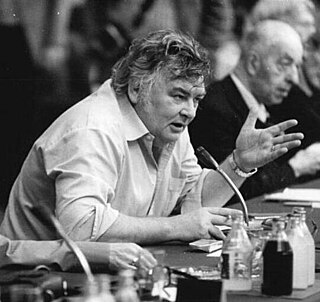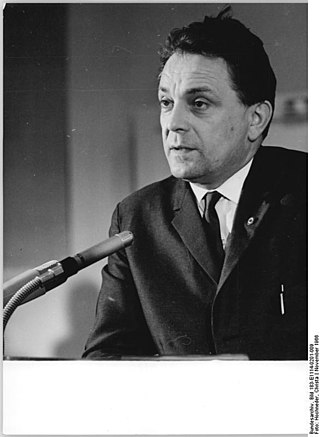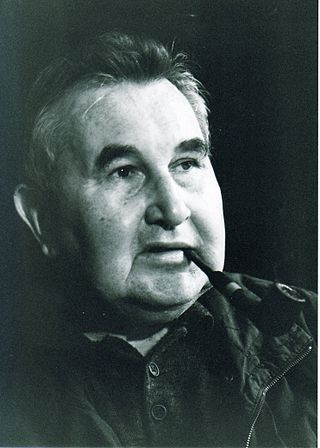External links
- Helmut Hauptmann in the German National Library catalogue
Helmut Hauptmann | |
|---|---|
| Born | March 12, 1928 Berlin-Kreuzberg, Germany |
| Occupation | Writer, literary editor, journalist |
Helmut Hauptmann (born 12 March 1928) is a German writer who was mainly active in the then East Germany.
Helmut Hauptmann grew up in a working-class family in Berlin-Kreuzberg. Near the end of World War II, he served as a Luftwaffenhelfer in Berlin and became a Prisoner of war at a camp in Schleswig-Holstein. After the Abitur, he worked with the Magistrate of Greater Berlin. Since the early 1950s, he has worked as a literary editor, journalist, and writer in Berlin.
Hauptmann writes narrative works that reflect the ideological optimism of early East Germany as well as travel journals which captured the experience of the writer in the Eastern Bloc.
Hauptmann was a member of the Schriftstellerverband der DDR since 1956 and the P.E.N.-Zentrum of East Germany since 1972. He is the recipient of the Erich Weinert Medal (1958), the Heinrich Mann Prize (1960), the art prize of the Free German Trade Union Federation (1964), and as well as the Heinrich Heine Prize (1969).
Hauptmann and his wife Ursula currently live in Berlin-Weißensee.

The National Prize of the German Democratic Republic (East Germany) (German: Nationalpreis der Deutschen Demokratischen Republik) was an award of the German Democratic Republic (GDR) given out in three different classes for scientific, artistic, and other meritorious achievement. With scientific achievements, it was often given to entire research groups rather than individual scientists.
Walter Ehrlich was a German philosopher.

Wolfgang Schreyer was a German writer of fiction, historic adventures mixed with documentary, science fiction for TV shows and movies and is best known as the author of over 20 adventure stories.

Dieter Noll was a German writer. His best known work is the two volume novel Die Abenteuer des Werner Holt from the early 1960s which had sold over two million copies by his death. The work was filmed in 1965.

Bernhard Seeger was a German author.

Günter de Bruyn was a German author.
The Handel Prize is an annual award, instituted in 1956, which is presented by the city of Halle, in Germany, in honour of the celebrated Baroque composer George Frideric Handel. It is awarded, "for exceptional artistic, academic or politico-cultural services as far as these are connected with the city of Halle's Handel commemoration". The prize consists of a diploma, a gold and enamel badge, and is presented during the annual Handel Festival, Halle.

Günter Kochan was a German composer. He studied with Boris Blacher and was a master student for composition with Hanns Eisler. From 1967 until his retirement in 1991, he worked as professor for musical composition at the Hochschule für Musik "Hanns Eisler". He taught master classes in composition at the Academy of Music and the Academy of Arts, Berlin. He was also secretary of the Music Section of the Academy of Arts from 1972 to 1974 and vice-president of the Association of Composers and Musicologists of the GDR from 1977 to 1982. Kochan is one of eleven laureates to have been awarded the National Prize of the GDR four times. In addition, he received composition prizes in the US and Eastern Europe. He became internationally known in particular for his Symphonies as well as the cantata Die Asche von Birkenau (1965) and his Music for Orchestra No. 2 (1987). His versatile oeuvre included orchestral works, chamber music, choral works, mass songs and film music and is situated between socialist realism and avant-garde.
Fritz Rudolf Fries was a German writer and translator.

Margaretha "Greta" Kuckhoff was a Resistance member in Nazi Germany, who belonged to the Communist Party of Germany and the NKVD spy ring that was dubbed the Red Orchestra by the Abwehr. She was married to Adam Kuckhoff, who was executed by the Third Reich. After the war, she lived in the German Democratic Republic, where she was president of Deutsche Notenbank from 1950 to 1958.

Erik Neutsch was one of the most successful writers in East Germany.
Hans Jürgen Wenzel was a German conductor and composer. He was chairman of the Verband der Komponisten und Musikwissenschaftler der DDR and professor for musical composition at the Hochschule für Musik Carl Maria von Weber Dresden.
Werner Gustav Rudolf Gößling was a German conductor, Choir director, composer and university lecturer. He was chief conductor of the Philharmonisches Staatsorchester Halle and the Robert Franz Singakademie in Halle. In 1951, he was appointed General Music Director. From 1956 to 1958, he built up the first Chinese symphony orchestra in the European style.

Max Walter Schulz was an East German author and part of that country's literary establishment.
Olaf Koch was a German conductor and Hochschullehrer.

Werner Heiduczek was a German writer. His works have been translated into more than 20 languages and name as author – depending on the language region – Verner Gajduček, Verners Heidučeks or Verneris Heidućekas.

The Philharmonische Staatsorchester Halle was a symphony orchestra in Halle that existed from 1946 to 2006, which functioned as a concert orchestra and was last predominantly supported by the Land of Saxony-Anhalt. As a result of the fusion with the Orchester des Opernhauses Halle, the Orchestra was merged into the Staatskapelle Halle in 2006.
Andre Asriel was an Austrian-German composer.
Joachim Werzlau was a German pianist, radio consultant and composer. He belonged to the first generation of composers in the GDR, where he was also active in organisations and politics. As a pianist, he played for the theatre, for Mary Wigman's dance school, and a kabarett, among others. He composed popular songs, music for audio plays, film scores, incidental music, and three operas. With films such as Nackt unter Wölfen and Jakob der Lügner, he was the most popular film composer of the GDR of his time.

Eberhard Panitz was a German writer, screenwriter, literary editor and publicist. He wrote epic works, documentaries, audio plays and scripts for films and television. He was committed to socialist realism, and received several awards in the German Democratic Republic (GDR). After German reunification, he continued to write for leftist publishers.